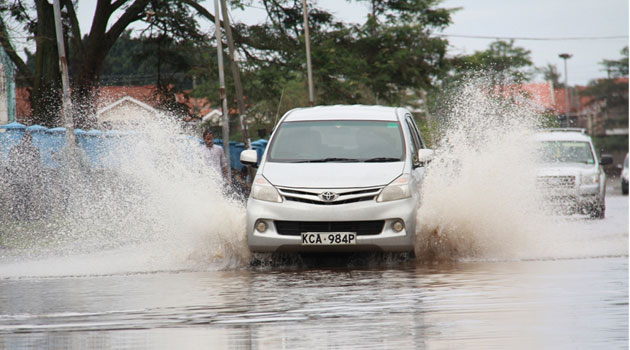
With a poor drainage system, the city soon gets engulfed in flood waters every time it rains. Photo/ FILE
NAIROBI, Kenya, Jun 15 – Popularly known as the Green City in the Sun, Nairobi the Kenyan Capital, has been now ridiculed as the city sitting in floods.
With a poor drainage system, the city soon gets engulfed in flood waters every time it rains.
Whereas, traffic snarl-up are common and something that city residents are familiar with, the rainy season in May presented an unprecedented blemish that made some people to consider relocating.
About 12 lives were lost in the month of May while property worth millions was destroyed.
READ: Counting the losses after Nairobi floods
It was a month that saw people spend more than 10 hours from the city centre to their homes on the outskirts of the capital.
READ: Flooding nightmare for Nairobi city residents
All this happened under the watch of the Nairobi County Government, National Environmental Movement Agency (NEMA) and other government agencies charged with the responsibility of ensuring a conducive environment.
NEMA failed to respond to our queries despite numerous phone calls and text messages enquiring about constructions on wetland areas in Nairobi.
Constructions on Wetland areas
Capital FM News went out on a mission to ascertain what hinders free flow of excess water during rainy seasons. It was obvious that lack of an efficient drainage system is not the only reason for heavy flooding in the city.
Capital FM News ascertained that wetland areas have not been protected as private developers have grabbed all available land even those in protected areas. They grab public land including rivers and streams. They even go the extent of changing the direction of the water flow to put up their constructions.
In Nairobi’s Spring Valley, a private developer has taken up a project worth billions of shillings.
The project had been stopped in 2009.
Environmentalist Professor Wangari Maathai, led demonstrators to pull down a perimeter wall and buildings constructed on the wetland.
At the time, she was joined by Lands Minister Charity Ngilu.
READ: Maathai attacked while on conservation bid
Construction was halted then. However early this year, construction has resumed and there is no explanation why the private developer has been allowed to construct on a wetland area. Nairobi Governor Evans Kidero told Capital FM News that the county government was working on a programme to bring down all constructions that affect flow of water in the county.
“They (Spring Valley) are part of what we are doing at the moment. All buildings on riparian land, the ones that violate the environment will be brought down including that one (in Spring Valley),” he said.
Opposite T-Mall Roundabout near Nairobi West, are two buildings under construction, one is five-storey while the other is still at the initial stages of construction.
According to Executive Committee Member in Charge of Urban Development and Planning Tom Odongo, the five-storey building is constructed less than two meters from a nearby river instead of being six meters away.
The second construction which has its foundation submerged in water is built on where the river flow was.
Odongo said the direction of the water flow was changed for the construction to be put up.
READ: MP’s building faces demolition near T-Mall
Along Mbagathi way, another building worth Sh1bn is constructed close to the same river that flows to Nairobi West area. The building has been marked for demolition.
READ: Kidero stops construction of Sh1bn business complex
However, questions arise, who gave licenses to developers to put up constructions on wetland areas?
Plastic Bag Menace
The insufficient drainage system that exists is poorly maintained; littering of plastic bags is another contributor to clogged drainage systems.
According to County Executive Member for Roads and Transport Abdullahi Mohammed, the inadequate drainage system in the city is also overwhelmed by the rate at which people litter.
He expressed concerns that the existing drainage pipes are completely filled with plastic bags. Though plastic paper bags have been identified as a major environmental threat, the debate on a full ban is yet to bear fruits.
This is because use of plastic bags remains a big challenge, with a population that believes branded plastic paper bags are trendy.
Use of plastic paper bags has also become a culture that will take time to stop.
According to Nakumatt Public Relations Manager Alfred Nganga the supermarket which has 39 branches across the country, is grappling with convincing Kenyans to use re-usable bags.
It has a weekly campaign every Thursday dubbed ‘Think green, Go blue’ where consumers are informed on the importance of using re-usable bags.
“It is very difficult for a customer to accept a carton. They think branded paper bags are prestigious. So customer acceptance is still very low and not commensurate with the efforts we are making to reduce use of plastic bags,” he said.
In Africa, the Government of Rwanda made history when it banned use of plastic paper bags.
Whereas it was done for agricultural reasons, it was also to stop clogging of drainage system that led to flooding during rainy seasons.
In Singapore, the penalties are even more stringent to an extent that chewing of gum was banned in 2004.
Chewing gum is only bought with a doctor’s prescription and if anyone makes a mistake of littering, he/she cannot get away without paying a fine of about Sh50,000 ($500).
In this year’s budget, Treasury Secretary Henry Rotich introduced a tougher excise duty on plastics made from biodegrable material to discourage use of plastic bags in Kenya.
“To address the challenges of environmental degradation caused by careless disposal of plastic bags, I have enhanced the excise duty on non biodegrable plastic to Sh120 per kilogram,” Rotich asserted.








































